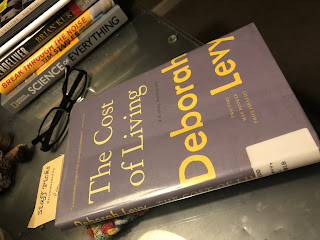The Cost of Living by Deborah Levy (thanks, Erin!)
My kids consume books the way I do, which means I spend a lot of time at the local library. Two weeks ago, I walked in vowing not to get anything new. I picked up The Cost of Living anyway from the rack of recommended titles. While I’ve not read Levy’s fiction, the trim size and the fact that this was an abbreviated memoir won me over. It also mattered that “Erin” thought it worthy of recommendation. I now know why. (Thanks, Erin!)
The Cost of Living starts on the coast of Columbia, where the author overhears a silver headed American man talking at a young woman traveling alone in the country. The woman tells a story of a storm on a diving trip and a companion’s betrayal— of her trust, anyway. The man, clearly angling for something more than a conversation, tells her “You sure do talk a lot” before inviting her for a night swim. The woman had said she’d come up in the water in a swirling storm and swam back to the boat. She didn’t swim to this one.
This short collection of essays takes us through Levy’s life post-divorce. She doesn’t demonize her ex here, but notes that she came up after 20 years to find herself away from the boat of her marriage and determined not to swim back. She meets her own “Big Silver,” the name the young woman in Columbia bestowed on the man. She finds a flat, makes a home, watches a friend jump back into marriage, loses her mother and quietly and wonderfully meets new people who fly into her life or perch nearby like the parrots she discovers on her apartment porch.
What I’ll want to remember:
- Levy’s love of her new electric bike and the thrill she admits to getting from riding it.
- Her encounter with another Big Silver— a man who fixates on (but doesn’t really talk with) Levy while ignoring his wife. As she says when describing the man in Columbia: He clearly sees himself as the major character in every story and women as minor characters.
- The collection of friends she assembles: the neighbors in her depressing building, the older woman who rents her out a writing shed, and the grieving man at a friend’s funeral.
- The solitary life she leads. I have always enjoyed memoirs and travel accounts. My favorite book as a kid was Robinson Crusoe. Part of what I admit to enjoying was Levy’s similar, often solitary struggle to fashion a new life and residence in the quiet of her new life.
What I’ll certainly remember about this book is Levy’s work in the last days of her mother’s life to be with her, ease her suffering and do both by buying her popsicles each day. She frequents a shop again and again for this purpose, never revealing to the Iranian (I believe) brothers who run the store of her reason for digging out and buying two pops daily. When they run out of all but a repulsive flavor, she doesn’t talk to them about her desperate need for replacements. She buys what they have, which her mother mostly can’t consume.
Later, after her mother’s death, she is back in the shop and tells the brothers why she’d been in each day. The brothers are very sorry, maybe even shaken. They would have found more pops, had they known; gone to other stores for her if necessary. Though Levy doesn’t say it, it’s like another boat that drifts by for her to hold onto for a moment. A while later, she’s in the store again when one of the brothers, having just returned from their home country, hands her a tea cup with a lid that is commonly used in their country. She recognizes, she writes, that it is a condolence gift.

Comments
Post a Comment